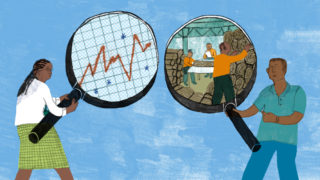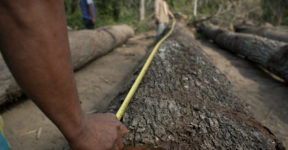
Strengthening Accountability in the Forest Sector
Alison Hoare, David Young, Thiago Uehara, Mustapha Kaluwe Seidu, Gene Birikorang, Laurence Wete Soh and Justin Kamga Kamga set out their views on what should be the priorities for reform to improve forest sector accountability in Cameroon, Ghana and elsewhere.
Significant efforts have gone into increasing transparency and the participation of non-state actors in the forest sector over the past 20 years. A recently published research paper explores case-studies in Cameroon and Ghana to assess the impact that recent improvements in transparency and participation have had on accountability and reveals that the processes of change have been complex, involving multiple, interlinking pathways.
However, increased transparency and meaningful participation were found to have played a role in improving accountability of both the government and private sector. Furthermore, there were some indications that these changes are having a positive impact on the management of the forest sector.
Nevertheless, in both countries, there is the need for further reforms to build on, and consolidate, the gains made – some of which are fragile. The authors of the research paper reflect on the lessons learnt and possible next steps for further reform.
Such frameworks, setting out the requirements for transparency and providing space enabling stakeholders to engage in governance processes, provide an important basis for demanding accountability.
Laurence Wete Soh: Although Cameroon adopted a Code of Transparency and Good Governance in Public Financial Management in 2018, there is not yet a legal framework setting out requirements for transparency and participation on environmental and forestry issues. The adoption of such a law would have a considerable impact on the accountability of actors in these sectors. The legal framework should also be followed by institutional means and operational mechanisms to which citizens could resort in the event of shortcomings or insufficiencies of the actors concerned.
Justin Kamga Kamga: Improving accountability in the forest sector requires the existence of a legal framework that governs the participation of stakeholders in the management of forest resources. A fundamental element that could increase accountability is to put in place a mechanism to protect non-state actors involved in denunciation vis-à-vis reprisals from administrations or lobbyists who take advantage of poor governance.
While citizens may have a strong motivation to engage in forest governance, they need the appropriate skills and knowledge to be effective. Capacity-building must therefore be an important part of reform efforts.
Laurence Wete Soh: In a context where the administration does not have a legal obligation to report to users, the awareness by citizens of the legitimacy of their participation in forest management induces a commitment to be active participants in the quality of governance in this sector.
Justin Kamga Kamga: The credibility of non-state actors involved in the process of improving governance and strengthening law enforcement is a function of its quality of participation. To drive change, it will have to fill in the shortcomings of the administration in the fight against illegality. The effectiveness of the participation of an actor also rests on their ability to interact with other actors for lobbying.
David Young: While keeping up the demand for greater access to information and decision-making, civil society also needs to develop the capacity to use the information they have. For example, access to key information in Ghana’s wood tracking database has the potential for high quality, in-depth analysis, especially if correlated with independent forest monitoring work revealing where improvements have happened and where systemic problems stubbornly remain. Civil society needs to be ready to do this and they need sustained donor support to have the confidence to invest in the skills required.
Thiago Uehara: With greater education and citizen participation, one might question how and when the state could build and strengthen its monitoring capacity complementary to the ones enacted by civil society organizations and international donors. But, again, it is important to observe who is being enabled to participate in policymaking and in forest governance decisions. Under an equity perspective, it would be worrisome if one noticed that only the internationalized bourgeoisie and male local elites are being enabled in ‘participatory’ frameworks. Tokenistic participation has to give way to systems that encourage peoples’ sovereignty, inclusion and equity principles in transparency-accountability frameworks.
Participation should be more than simply consultation and, where appropriate, it should allow for decision-making and sharing of powers and responsibilities.
Gene Birikorang: The paradigm of lawyers exercising monopoly over legal drafting must change to engaging civil society organizations and communities in the early and concluding stages of legal processes. Much of the ‘disguised’ exercise of discretion by the state that works against community interests is a threat to the long-term welfare of forest communities. Furthermore, the phenomenon of state capture, characterized by the forest regulator comprising all forest service functions, needs to be broken. The role of forest monitoring, therefore, will need to be devolved from the state to civil society.
Thiago Uehara: Even with some evidence of increased participation and transparency mechanisms, it is clear that people living in and around tropical forests have not enjoyed a fair share of the benefits that are drawn from a global system of forest exploitation. Furthering citizen participation and the understanding of how the benefits are distributed between genders, ethnicities, generations and countries could create the conditions for citizens to question the customs and rules in place. For example, one might question why policymakers decided that only 5 per cent is the baseline for what communities should receive from stumpage fees in Ghana while corporations have far higher advantages – with their profits often transferred away from the producing country.
To achieve robust, long-term change, a good understanding of the political economy is needed. Effective change management is also of critical importance.
David Young: Despite a significant increase in evidence of governance failures and illegality some accountability challenges remain unresolved. This suggests to me that we need to focus more on the political economy of the sector – what makes a government or forest authority quite open to reform at one moment and then equally intractable and even undermining of civic space the next?
Justin Kamga Kamga: It is important to promote the involvement of other sectoral ministries by highlighting their interests in the forestry sector. For example, showing the administration in charge of finance the opportunity to increase state revenues or showing the labour administration the opportunity to protect workers' rights or showing the administration in charge of the environment the opportunity to better watch over the integrity of the environment.
Mustapha Kaluwe Seidu: Transparency is a threat to the comfort of the people requested to be transparent. Achieving transparency therefore ought to be a process – multi-dimensional – entailing behavioural change management involving the rank and file of the institution.
Time for reflection on both the successes and failures of reform efforts is required while international trade partners can play an important role in pushing for further reforms.
Alison Hoare: Establishing the impact of improved transparency and participation on accountability has proved difficult. This is in part because of the complexity of the processes of change but it is also because of limited opportunities for reflection on these changes. Greater attention is needed, therefore, to documenting and analysing reform processes so that these can be enhanced and built on more effectively.
Mustapha Kaluwe Seidu: Civil society should keep being civil society and not become guard dogs for state institutions. Let’s use our connections with the trade blocs of Europe and North America to increase pressure for changes in natural resources governance and production methods.
For more information read the Chatham House research paper ‘Forest Sector Accountability in Cameroon and Ghana: Exploring the Impact of Transparency and Participation’.


